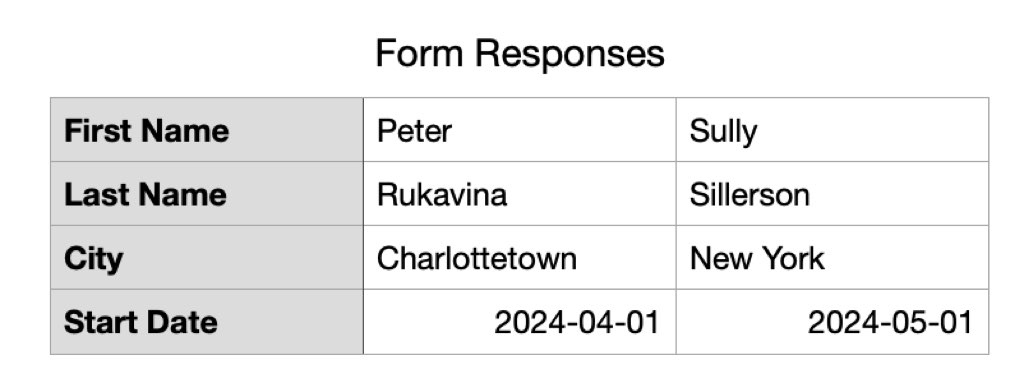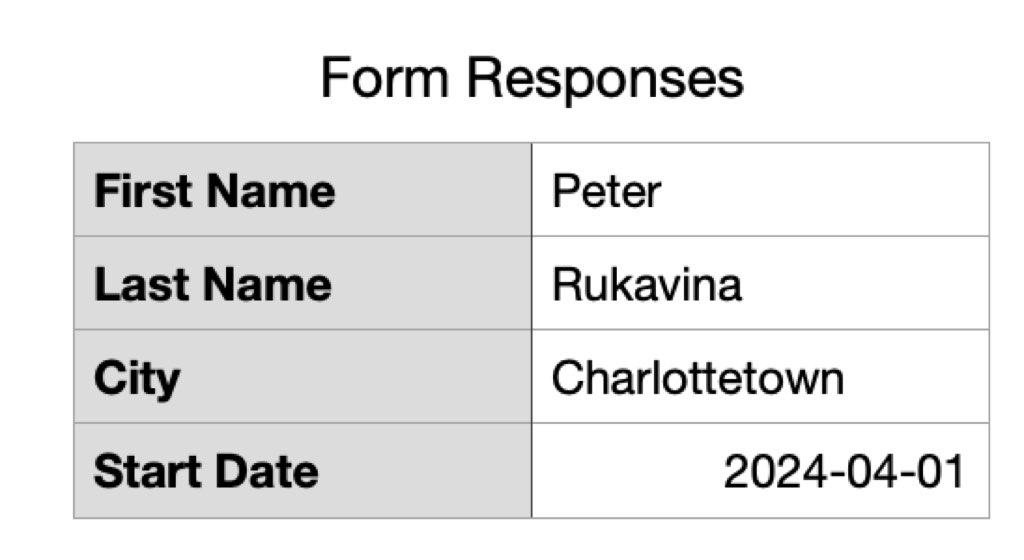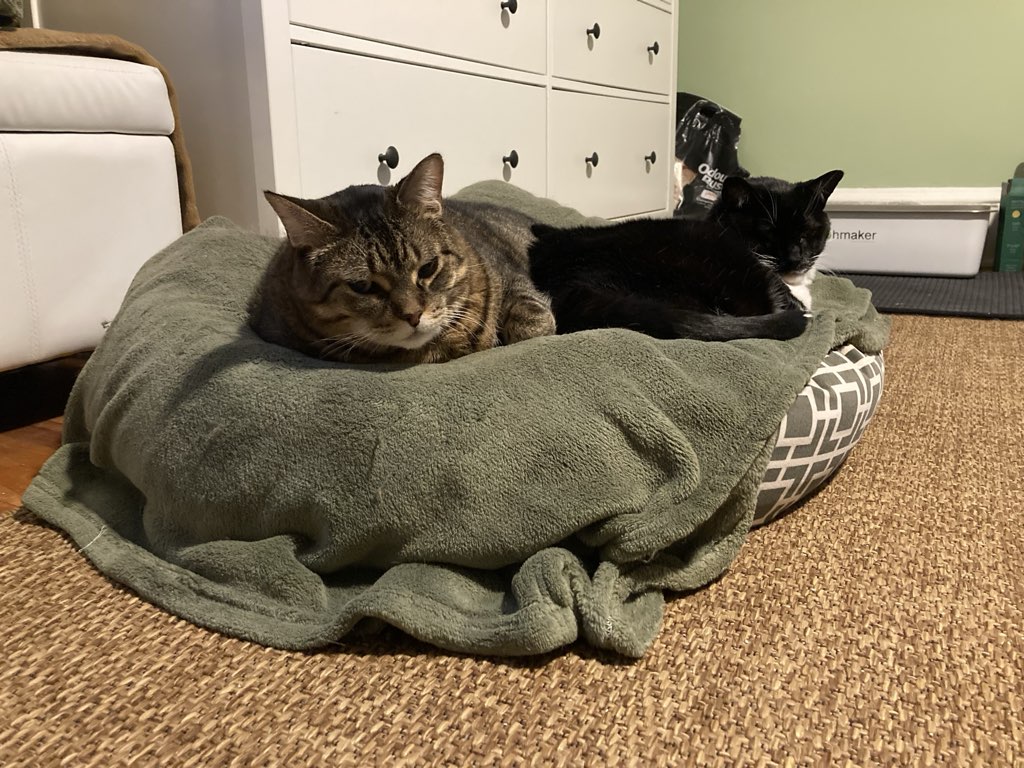I’ve been working out, twice a week, one-on-one, with Coach Cayla, for the last 22 weeks. That’s almost 50 workouts; a lot of Bulgarian Box Jump Reverse Crunches.
As Lisa will attest, in the early days I used to drag myself home from the gym, exhausted.
I just wanted to lie down.
This caused a frisson of tension in our relationship.
I’m happy to report that, on leaving today’s workout, I feel energized, spent-but-not-exhausted, and eager to return on Tuesday.
Starting on March 7, 2024, I’m switching from private training to semi-private, as Cayla is launching a semi-private class on Tuesdays and Thursdays at 9:00 a.m.
Maybe you’d like to join, to help make up a group of six?
Cayla assures me that the class can accommodate anyone, from seasoned veteran to I’ve-never-been-in-a-gym. I am proud to vouch for her: she is patient, an excellent explainer, and she knows her stuff.
Lisa and I have worked out together half a dozen times in the last few months, and I can attest that, as much as I benefited from the one-on-one work with Cayla to get me over the hump of schlumpitude, working out with other people brings a whole new element, a hearty mix of competition and solidarity. I’m looking forward to it.
If you’re interested, or want more details, you can contact Cayla through her website.
It will be fun!
In letterpress, lockup is the process of assembling a jigsaw puzzle of rectangles around the type to lock it all in place, with the ultimate goals of (a) having it not fall out while on the press and (b) having all the type level, so that it gets inked evenly and prints uniformly.
The pieces of this jigsaw puzzle, beyond the type, are a mixture of wooden and metal furniture, mixed with properly-sized-to-the-type metal spaces of varying widths.
In a not-completely-outfitted shop like mine, lockup can be particularly challenging, due lack of diversity and quantity of furniture, but lockup is always challenging anyway.
Here’s a photo of my lockup for one side of the February This Box is for Good box. This was, indeed, challenging, as space was at a premium, yet the specific distance between LOVE and FOOD needed to be exact, and BE THE needed to be centred under FOOD. I’m proud that I managed to pull it off, even if it is a little Frankensteinian.
Lisa and I walked up to CBC Charlottetown this morning to record an interview with Matt Rainnie about our This Box is for Good project. As usual, Matt was an amiable and welcoming host.
We played a rousing game of Monopoly with my mother last week, using an older game that came from my sister-in-law’s family. I love the typography and the concision of the “Brief Idea of the Game” section:

The other morning at breakfast we were wondering what percentage of squirrels are online.
We were wondering this because, the previous day, I’d left a This Box is for Good box filled with chocolate on the doorstep of a friend, and Lisa wondered if, before it got to her, it might be captured by squirrels. And so we wondered if, having so-captured the box, the squirrels would follow up by registering the box on our website, as the box instructs.
This led us, as you can understand, to wonder “What is the percentage of squirrels that are online?”
So I asked Perplexity, the AI-powered search engine that New York Times writer Kevin Roose recently took for a ride by way of seeing whether it might out Google as his go-to place to find things out:
Hundreds of searches later, I can report that even though Perplexity isn’t perfect, it’s very good. And while I’m not ready to break up with Google entirely, I’m now more convinced that A.I.-powered search engines like Perplexity could loosen Google’s grip on the search market, or at least force it to play catch-up.
Here’s how Perplexity answered:
The question seems to be based on a misunderstanding or a joke, as squirrels, being non-human animals, do not have the capability to use the internet or be “online” in the way humans do. Squirrels are small mammals known for their bushy tails and propensity for climbing trees. They are found in many parts of the world and are often seen in urban areas, but they do not have the cognitive ability or physical means to access or use the internet.
I love that reply six ways from Sunday.
François Chollet, software engineer and AI researcher at Google, writes on Twitter (via Simon Willison):
People seem to be falling for two rather thoughtless extremes:
1. “LLMs are AGI, they work like the human brain, they can reason, etc.”
2. “LLMs are dumb and useless.”Reality is that LLMs are not AGI — they’re a big curve fit to a very large dataset. They work via memorization and interpolation. But that interpolative curve can be tremendously useful, if you want to automate a known task that’s a match for its training data distribution.
Memorization works, as long as you don’t need to adapt to novelty. You don’t *need* intelligence to achieve usefulness across a set of known, fixed scenarios.
(LLM is Large Language Model, the most well-known gateway to which is ChatGPT; AGI is Artificial General Intelligence, the notion of a computer that can think like people can).
Outside of the realm of AI, his statement “You don’t *need* intelligence to achieve usefulness across a set of known, fixed scenarios.” echos what I tell people who are skittish about travelling to a destination where they don’t speak the language (and where their language isn’t commonly used): you don’t need to be fluent in Spanish to order coffee in a Spanish café, you can just say “café, por favour.”
Similarly, you can point at a baguette in a Parisian bakery, and say “un, s’il vous plaît.”
You can do the same thing when you’re pointing at a flavour of ice cream.
You can accomplish a surprising amount by memorizing a few key phrases and using them in known, fixed scenarios. We once had a lovely bus ride from Venice to Ljubljana, on the Florence-to-Sofia run, with a very kind group of Bulgarian workers returning home. We shared food with them, and they with us.
“As long as you don’t need to adapt to novelty,” which is a lot of travel (a bakery is a bakery is a bakery), everything goes fine. Doesn’t help when the bus stops in the middle of nowhere and everyone’s told to get off, or when the bakery is out of bread, or you need a membership to shop at the Italian coop grocery. Or when your Spanish waiter asks you what type of coffee you want. But, most of the time, in most places, you can get by just fine using the dataset you carry around about the basics of how the world works.
I’ve been scheduling interviews for the last few days, and part of that job has involved taking a spreadsheet exported from Typeform (where we collected responses to a questionnaire from candidates) and trying to find a way to make a report from it.
You’d think this would be easy, the kind of thing people do in offices all day long.
All I want to do is take this:
First Name,Last Name,City,Start Date Peter,Rukavina,Charlottetown,2024-04-01 Sully,Sillerson,New York,2024-05-01
And turn it into this:
First Name: Peter Last Name: Rukavina City: Charlottetown Start Date: 2024-04-01
With one person’s details on each page.
I can sort of do that by loading the spreadsheet into Numbers and selecting Table > Transpose Rows and Columns. This gets me halfway there; from that point, I can selectively hide and show columns, print each, and get where I want to go.



But surely.
My second real computer job, when I was 16 years old, was at the Canadian Tire store in Burlington, Ontario. I started off working there on the sales floor, selling Commodore VIC-20s to the unsuspecting; eventually I was moved upstairs to the comptroller’s office, where a copy of the newly-released Lotus 1-2-3 had recently arrived.
Lotus 1-2-3 was amazing. It’s hard to convey just how amazing it was to my teenaged eyes, but I loved it, and loved figuring out how to make it do all sorts of amazing things. Canadian Tire was able to learn much about itself because of my work, from how productive their mechanics were to gaining insights into wages vs. sales. Along the way I learned a lot about Canadian Tire, and business, about spreadsheets, and about how to be a computer consultant.
Using Numbers, more than 40 years later, isn’t much different than using Lotus 1-2-3 back then. There certainly hasn’t been 40 years worth of innovation or creativity applied to the category.
The underlying issue here, of course, is that Numbers is a spreadsheet, whereas what I really want is a database manager. Indeed, I made a good living from being a dBASE manager for much of my 20s.
Producing reports was one of the things dBASE did well, and what I really want is its modern equivalent.
But apparently there isn’t one. Whereas VisiCalc begat Lotus 1-2-3 begat Numbers, it seems like FileMaker and dBASE and their ilk are a category of consumer software that died on the vine.
(Technically FileMaker didn’t die, it just became something else: an $800 piece of enterprise software that can, indeed, produce a report from an imported spreadsheet.)
What do people do these days when they want to keep track of generic things, search for those things, report on those things, share those things?
When did computers on our desks stop being able to do that?
The East Pointers released Stronger Than You Know a couple of years ago:
The sound when the power goes out
Is so quiet and so loud
The wind’s blowing in some hard
It could knock your house down
Big waves and murky waters
Snow beaten sons and daughters
Hold on a little longer
You’re stronger than you know
Last year they released an acoustic outdoor version of the song, and this week brings an acoustic indoor version (I’m fairly certain these are not formal terms of art).
I love all three versions: it’s a hopeful song at a time when hopeful songs are helpful.
Almost forty years ago I drove across North America with my friend Joanna, from Peterborough, Ontario to Vancouver, BC.
We crossed over from Canada to the US in Sault Ste. Marie, and as we made our way through the Upper Peninsula of Michigan, it became evident that it was deer hunting season: not only was everyone and their brother wearing bright orange vests, but there was a show on AM radio that consisted, in that pre-cell-phone era, entirely of messages sent from home to hunters in the field. “This goes out to Bobby and Jake up in Marquette, from Jeanny and Lou. Happy hunting!”
Also on the AM radio was a novelty song, in heavy rotation, by Da Yoopers called Second Week of Deer Camp, the chorus of which went like this:
It’s the second week of deer camp
And all the guys are here
We drink, play cards, and shoot the bull
But never shoot no deer
The only time we leave the camp
Is when we go for beer
The second week of deer camp
Is the greatest time of year
That chorus was catchy enough—and we listened to the song enough times—that it wormed its way into my ears, where it’s been resident all these decades.
I thought of the song this morning while I was shovelling the stairs here at the north-of-Euston branch of the Rukavinas where we are in residence for “Cat Camp” for five days while my brother and sister-in-law take a much-deserved vacation. Our nominal roles here are to support Mom, who lives downstairs, and to feed, water, and inject the cats, who live up here, in the upstairs apartment where I write.

Cat Camp has happened to coincide with a weekend of a lot of snow. It’s not quite “snowmageddon,” but it’s close. It started snowing on Friday, and it hasn’t let up since.
This morning, fearing an accumulation of snow on the roof back at home base, I maneuvered the Kia Soul EV over very icy and snowy roads down south-of-Euston, and spent 30 minutes shovelling and roof-raking. The back roof—the usual problem spot for ice dams—was almost snow-free, but the front roof had about a foot of snow on it, and I managed to rake off a good chunk of it from the edge and back a few feet.
When I was done, I was able to power Lisa’s more-snow-capable 4WD out of the driveway, and the Soul back into the driveway, and returned to Cat Camp chastened by the weather. I suspect won’t be going back out.

Meanwhile, the cats are good. Mom is good. We have food, and a warm apartment.
It’s going to keep snowing until at least tomorrow morning; my weather app says we’ve received 19 cm of snow so far, and will receive another 26 cm in the next 24 hours, meaning we’ll have almost a foot and a half on the ground in total.
It’s the second day of cat camp, and all of us are here.
TL;DR We are recruiting for two positions to help support Olivia: a Supportive Roommate (details) and an Autism Life Skills Coach and Case Manager (details). Maybe you’re interested? And please share these opportunities far and wide.
Just under a year ago, Olivia moved into her own nearby apartment. Her capabilities meant that she needed some support for her move toward independence, so we cottoned on to the term “supportive roommate” to describe people who might live with her: roommates, but with added responsibilities to fill in some of the practical gaps in her daily routine. It was a long and multi-faceted process to get this off the ground—we needed to figure out how to compensate the roommates, how to pay the rent, what insurance would be needed, how groceries would get purchased, and 57 other things. We rented the apartment on December 1, 2022 and Olivia and her roommates moved in on March 1, 2023; the three months between were a full-court press to get everything in place.
We found roommates. We figured out the myriad issues, as best we could. We were aided by an incredibly helpful landlord and a cooperative case worker in the AccessAbility Support program. Lisa was instrumental to the conception and execution of the project; without her tenacity and work, it never would have happened. It was, and is, a part-time job for us to manage all the moving parts, but it’s all in service of Olivia’s thriving.
But it worked. It’s working. Olivia’s still there.
There have been ups and downs, twists and turns, and we’ve all had to adapt. But this model of non-institutional housing is emerging to hold promise for a way to support Olivia now and in the future (“in the future” for a parent of an adult child with a need for support is code word “after I’m gone”).
We’re now ready to launch Version 2.0 of this project, and this involves recruiting for two roles, one brand new, and one a backfill:
First, we’re looking for an Autism Life Skills Coach and Case Manager, an admitted mouthful of a job title that packs in a lot. The job ad for the position has much more information, but what it boils down to is this: we’re going to hire someone to help Olivia build on her strengths, route around her challenges, in a focused, systematic way, so that she can take on more independence, more responsibility for her daily life, more agency for what comes next for her. We’re looking for someone who’s a skilled teacher and a creative and dynamic coach, someone who will have the time and resources to go on deep dives with Olivia with a patience, flexibility, and focus that neither her harried parents nor her under-resourced educators have had the opportunity to do. We’re working with an HR agency to recruit for the position; it would be a big help if you could help share the job ad far and wide, as we know in our heart of hearts that the right person for Olivia is out there, but they might not live next door. The role is compensated with a salary and benefits.
Second, we’re looking for another Supportive Roommate to live with Olivia and her other supportive roommate. We’re recruiting for this position all by ourselves, and trying to spread the word through a Facebook post, with hopes it too will be shared far and wide (Facebook, for all my misgivings about it, is amazing for spreading this kind of thing; it was the route to finding her first two roommates last year). The apartment has been down to one supportive roommate since October, and we’ve all rallied to keep things humming, but it’s an arrangement that really requires two, so we’re eager to find someone new who will be a good fit. While there are some “functional” elements to the role—ensuring Olivia takes her meds, for example, and helping with meal preparation—what we’re looking for is an emotionally resilient person, comfortable living with others, who will help provide the sort of workaday social connection and community that Olivia craves. The role is compensated through no-cost housing and a stipend.
Again, we’d all appreciate it if you would give a thought to people in your network for whom one of these roles or the other might be a good fit, and take a moment to connect them with more information.
Thank you.
 I am
I am